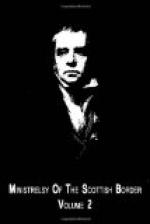with, and pursuit of the enemy; but when he and some
others were pursuing the enemy, others flew too greedily
upon the spoil, small as it was, instead of pursuing
the victory: and some, without Mr Hamilton’s
knowledge, and against his strict command, gave five
of these bloody enemies quarters, and then let them
go: this greatly grieved Mr Hamilton, when he
saw some of Babel’s brats spared, after the
Lord had delivered them to their hands, that they
might dash them against the stones.”
Psalm
cxxxvii. 9. In his own account of this, “he
reckons the sparing of these enemies, and letting
them go, to be among their first stepping aside; for
which, he feared that the Lord would not honour them
to do much more for him; and says, that he was neither
for taking favours from, nor giving favours to the
Lord’s enemies.” Burly was not a likely
man to fall into this sort of backsliding. He
disarmed one of the duke of Hamilton’s servants,
who had been in the action, and desired him to tell
his master, he would keep, till meeting, the pistols
he had taken from him. The man described Burly
to the duke as a little stout man, squint-eyed, and
of a most ferocious aspect; from which it appears,
that Burly’s figure corresponded to his manners,
and perhaps gave rise to his nickname,
Burly
signifying
strong. He was with the insurgents
till the battle of Bothwell Bridge, and afterwards
fled to Holland. He joined the prince of Orange,
but died at sea, during the expedition. The Cameronians
still believe, he had obtained liberty from the prince
to be avenged of those who had persecuted the Lord’s
people; but through his death, the laudable design
of purging the land with their blood, is supposed to
have fallen to the ground.—
Life of Balfour
of Kinloch.
The consequences of the battle of Loudon Hill will
be detailed in the introduction to the next ballad.
THE BATTLE OF LOUDONHILL.
You’l marvel when I tell ye o’
Our noble Burly, and his train;
When last he march’d up thro’
the land,
Wi’ sax and twenty westland
men.
Than they I ne’er o’ braver
heard,
For they had a’ baith wit
and skill
They proved right well, as I heard tell,
As they cam up o’er Loudoun
Hill.
Weel prosper a’ the gospel lads,
That are into the west countrie;
Ay wicked Claver’se to demean,
And ay an ill dead may he die!
For he’s drawn up i’ battle
rank,
An’ that baith soon an’
hastilie;
But they wha live till simmer come,
Some bludie days for this will see.
But up spak cruel Claver’se then,
Wi’ hastie wit, an’
wicked skill;
“Gie fire on yon westlan’
men;
“I think it is my sov’reign’s
will.”
But up bespake his cornet, then,
“It’s be wi’ nae
consent o’ me!
“I ken I’ll ne’er come
back again,
“An’ mony mae as weel
as me.




